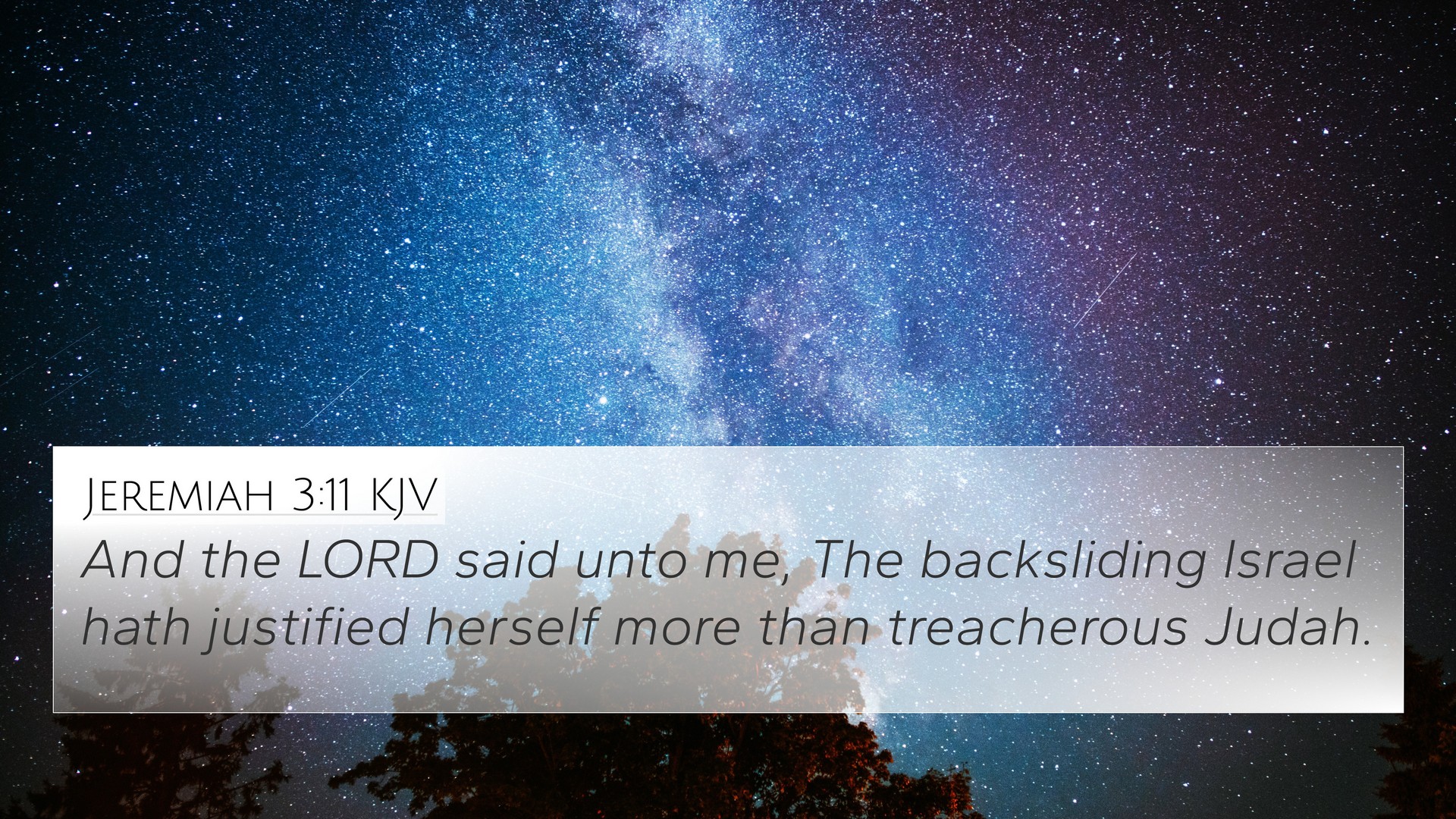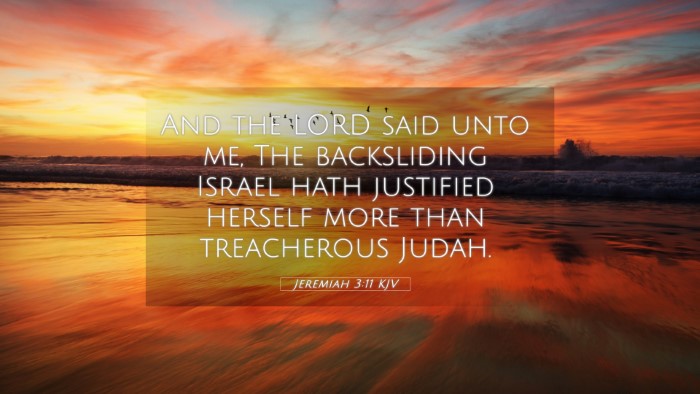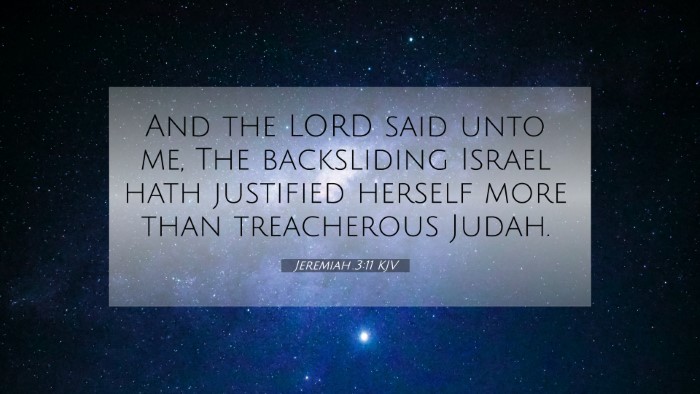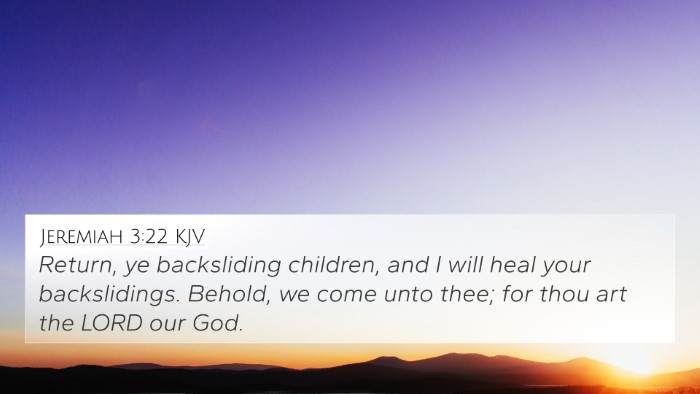Understanding Jeremiah 3:11
Jeremiah 3:11 states: "And the Lord said unto me, The backsliding Israel hath justified herself more than treacherous Judah." This verse is a profound commentary on the spiritual state of the people of Israel and Judah during the time of the prophet Jeremiah. In this context, God is addressing the unfaithfulness of His people and establishing a comparison between the two kingdoms, Israel and Judah.
Contextual Background
This verse comes from a period when Judah was witnessing the consequences of sin and idolatry. Israel had already faced God's judgment through captivity due to similar transgressions. Here, the Lord reveals that even though Israel is described as 'backsliding,' she still holds a form of justification, indicating a deceptive self-righteousness as compared to Judah's open treachery.
Commentary Insights
- Matthew Henry: Henry highlights that Israel's backsliding is not merely a setback but a significant departure from God. He emphasizes the self-justification of Israel in contrast with the more flagrant sins of Judah. Henry notes that while both nations are guilty, Israel's posture is somewhat less egregious than that of Judah.
- Albert Barnes: Barnes discusses the idea that God's judgment on the nations reflects a deeper moral decline. He elaborates on the nature of Israel's comparison to Judah, accentuating the points of treachery and faithfulness in the eyes of God. This self-justification leads to the greater condemnation of Judah, illuminating the complexity of divine judgment.
- Adam Clarke: Clarke delves into the implications of the term 'backsliding.' He points out that the Israelites had developed a rationale to justify their sinful behavior, positing that such rationalization can be seen in contemporary society as well. Clarke suggests that while God addresses the iniquity, the lesson is also applicable to modern believers who might engage in similar justifications.
Spiritual Lessons and Applications
The essence of Jeremiah 3:11 conveys critical insights into the nature of sin, self-justification, and God’s unyielding justice. Several lessons from this scripture include:
- Self-Justification: Believers are warned against the tendency to rationalize their sins. It serves as a reminder that God sees all and discernment is crucial.
- Divine Comparison: The comparison between Israel and Judah signifies that God’s judgment can differ based on the heart’s posture, challenging believers to maintain a sincere relationship with Him.
- The Need for Repentance: The verse emphasizes the importance of true repentance and the dangers of a calloused heart. Acknowledgment of sin is essential for restoration.
- God’s Faithfulness: Despite the unfaithfulness of His people, God's message is clear: He desires a return to Him; thus, hope and restoration remain integral themes throughout the Prophets.
Cross-References and Scriptural Texts
Jeremiah 3:11 strongly connects with several other Biblical verses that reflect similar themes regarding sin, repentance, and divine judgment:
- Hosea 14:1-2: A call for Israel to return to the Lord, acknowledging their iniquity and seeking His mercy.
- Isaiah 1:18: God's invitation for His people to reason together, underscoring the potential for forgiveness despite their sins.
- Ezekiel 18:30: Encourages repentance and turning from all offenses to receive life.
- Romans 2:1: Illustrates how self-righteousness can lead to judgment on others while ignoring one's faults.
- 2 Chronicles 7:14: A promise of healing and restoration contingent upon humbling oneself and turning back to God.
- Matthew 23:37: Jesus expresses lament over Jerusalem, revealing the depth of His desire for His people to return.
- Revelation 3:19: A warning that chastens those whom God loves, advocating repentance.
- James 4:6: Highlights God's opposition to the proud but grace to the humble, pointing to the heart condition required for receiving mercy.
Conclusion
In exploring Jeremiah 3:11, it becomes evident that the scripture not only exposes the faults of Israel and Judah but also invites reflective self-examination for all believers. As one studies the connections between Bible verses, they identify themes that bridge the Old and New Testaments, enriching their understanding of God’s overarching narrative of grace, repentance, and redemption.
Tools for Further Study
For those interested in delving deeper into this verse and its related connections within Scripture, utilizing tools such as a Bible concordance, a cross-reference Bible study guide, or a comprehensive Bible cross-reference system can enhance one's study experience. These resources help in systematically identifying and understanding the cross-references in the Bible, facilitating a richer theological engagement.
Encouragement for Ongoing Exploration
As believers seek to understand how specific verses relate to one another, it becomes essential to engage in regular study, reflection, and application of those truths in their lives. By cross-referencing Biblical texts, one not only uncovers the rich tapestry of God's Word but also equips themselves for deeper insights into His character and purpose.









